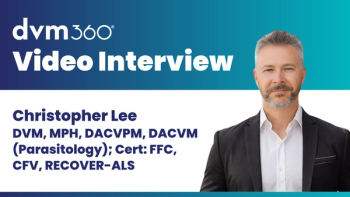
- dvm360 August 2020
- Volume 51
- Issue 8
Understanding the limits of your noncompete agreement
It’s no mystery that associate veterinarians, in an effort to figure out if their noncompete is enforceable, find themselves trying to solve, well, a mystery.
New legislation and court opinions throughout the country are making what used to be a fairly clear prohibition on contractually specified competing practice instead a confusing puzzle of definitions, case-by-case interpretations, and newly enacted statutes.
In Massachusetts, for example, the enforceability of a noncompetition agreement may depend on whether it was entered into before or during the employment relationship. In Rhode Island, enforceability might hinge on whether the agreement is signed as part of a separation-from-employment deal. In Washington State, whether your noncompete will be upheld might depend on the salary you made when you signed the agreement or your pay rate when your employment terminated.
The increasing complexity around noncompetes creates just as big a challenge for practice owners (including corporations). On one hand, restrictions that are too broad could be struck down as not having a realistic relationship with the “goodwill protection” actually needed by the clinic that drafted it. On the other hand, if a noncompete is created with an insufficient duration or distance (perhaps for the sake of ensuring enforceability), the document offers little protection to the drafter.
The new trend is an old idea
Throughout the many years when practitioners’ noncompete terms were relatively certain to be enforceable in most jurisdictions, many drafters ignored or glossed over a potential companion or alternate provision known as a “client nonsolicitation language.”
Post-employment nonsolicitation clauses have existed for a long time. And in the new world of judicial and legislative distaste for noncompetes, these clauses may be moving to the forefront of veterinary employment law.
Simply put, a nonsolicitation agreement (NSA) expressly prohibits a former employee from reaching out to existing clients of their former employer for the purpose of encouraging them to quit that employer and instead come to the employee’s new employer (or a practice the employee might start up or purchase after exiting employment).
NSAs seem ideal at first blush. So why have they not been more widely used in the recent past? And, for that matter, if they weren’t popular before, why are they becoming more widely used nowadays?
A solid, enforceable noncompete still trumps an NSA
In a situation where a veterinary practice enters into an associate noncompetition agreement that is fair, reasonable, and signed in a state that “doesn’t hate” noncompetes, the train to enforcement is quick and fairly obstacle-free:
- Obvious violation of the agreement may entitle the practice to an injunction or temporary restraining order. This stops the violator immediately, not a year or more later when the case might reach trial.
- Proof is easily ascertainable. If the noncompete area is Manhattan and the associate goes to work near Times Square—boom, proof is complete.
- The idea of hiring an associate who is burdened by a noncompetition agreement scares potential employers whose offices are within the noncompete radius. They don’t want to find themselves with no veterinarian (if a temporary restraining order is issued) and in the crosshairs of the new potential hire’s old boss, who might initiate a long course of noncompete litigation.
But NSAs have one big plus
NSAs don’t carry the level of intimidation brandished by noncompetes. An NSA basically says: “Associate, you can work where you like but under no circumstances may you call up our clients or send them letters, texts, or emails suggesting that they come see you at your new spot.” That sounds fairly reasonable and, in fact, legislators look much more favorably on NSAs than on noncompetition agreements.
For example, the Rhode Island Noncompetition Agreement Act, which became effective January 15, 2020, places numerous limitations on noncompetition covenants in that state. However, it specifically excludes NSAs from coverage by the statute.
So, why not go with an NSA every time?
There are three big drawbacks in enforcing an NSA:
- Proving solicitation of clients is not easy. Evidence that an NSA has been violated often requires testimony from a client who has been “solicited.” Clearly, no client who leaves the old practice and has their records transferred is going to be willing to testify voluntarily that any solicitation occurred. That leaves the clinic that is trying to prove an NSA violation to identify clients who were solicited but chose to stay put.
- The definition of “solicitation” is a moving target. Calling a former employer’s clients and recommending they change practices is clearly solicitation, but what if a client calls the departing clinician at home because he heard “through the grapevine” that she was moving to a new practice? Is it solicitation if the new clinic announces the arrival of the new doctor on its website? What if the veterinarian who is moving to a new practice states on her Facebook page that she is leaving her old job? If that is OK, can she also name her new clinic and say she is accepting new patients?
- A new employer can take steps to mitigate the impact of an NSA. Once the departing DVM begins working at a new hospital, what is there to prevent the new boss from aggressively marketing the services of his or her new hire? The new employer was never a party to the NSA signed by his new associate. Further, nothing prevents an associate who has taken a new job under the cloud of an NSA from asking their new office to prepare a form to be signed by clients that they have come to that hospital to see that new vet entirely of their own volition.
Nonsolicitation law is developing and changing rapidly
The legal status of both noncompetition agreements and NSAs is in constant flux, owing to the strengthening of “right-to-work” advocacy. But just as powerful an influence is the rapidly emerging law of information technology. Competition and solicitation become very hard to define and control through legislation when social media and telemedicine challenge the imagination of even the most skilled drafting attorneys and judges.
The best advice for both private practices and corporate hospital chains looking to protect their client base and goodwill is this: Do not let your employment contractual language get stale; review it regularly and make an effort to see how your existing employment documents comport with developing and morphing law.
Christopher J. Allen, DVM, JD is president of the Associates in Veterinary Law P.C., which provides legal and consulting services exclusively to veterinarians. He can be reached via e-mail at info@veterinarylaw.com. Dr. Allen serves on dvm360 magazine's Editorial Advisory Board.
Articles in this issue
over 5 years ago
Gene editing in animals: Miracle or madness?over 5 years ago
Compassion-First adds 43rd veterinary practiceover 5 years ago
First diagnostic test for canine IBD now availableover 5 years ago
FDA approves generic carprofen chewable for dogsover 5 years ago
When cats get hangry…over 5 years ago
Why we need more veterinary colleges at HBCUsover 5 years ago
DNA debunks age-old ratio for dog years to human yearsover 5 years ago
Quiet, please!Newsletter
From exam room tips to practice management insights, get trusted veterinary news delivered straight to your inbox—subscribe to dvm360.






